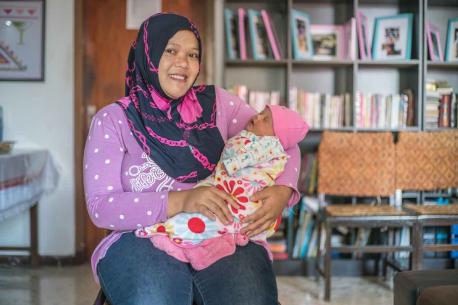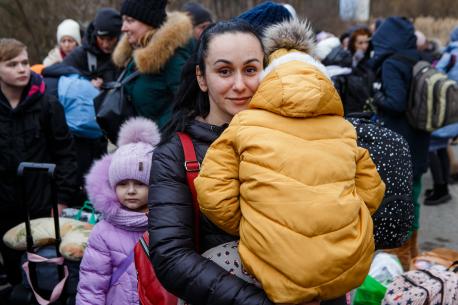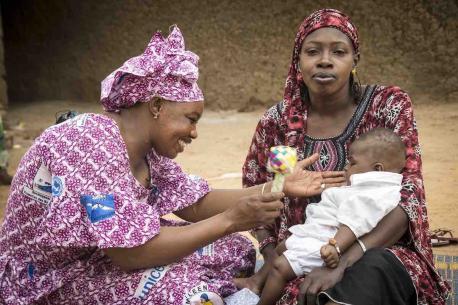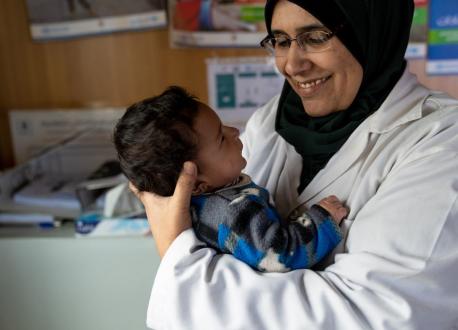
Midwives on Motorbikes Go the Distance for Indonesia's Moms
Raising families in remote regions can be tough, especially for mothers who must travel long distances to get their babies the health care that's so critical to the first 1,000 days of life. For moms who've just given birth, those journeys are sometimes impossible.
That's why UNICEF midwives don't wait for moms and babies to come to them. To reach every newborn, health workers make house calls to provide essential care. You can help give babies the best start in life by donating the supplies needed to make those home visits count.
Your gifts can help moms like Lina and her baby, Laticia.
They live in a remote area of Indonesia, which UNICEF midwife Widyani has covered thanks to her motorbike and donations from UNICEF supporters like you.
Laticia was born at the health clinic in Indonesia's East Java province where Widyani works. Widyani had already delivered over 2,000 babies before she became Lina's midwife, but each pregnancy is different. And at seven months, Laticia gave her mother and Widyani a scare.

“I had contractions and was very nervous, “ recalls Lina. But thanks to Widyani's quick diagnosis, Lina was rushed to a gynecologist, who gave her medication to prevent preterm labor and protect her baby's health. Laticia, sleeping above during one of Widyani's home visits, was born full-term — with Widyani in attendance.
"My biggest motivation to become a midwife is that it's unique," says Widyani. "But it's not for everyone. Midwives need to be brave enough to assist childbirth with all the risks."
Widyani has been a midwife for 22 years; she's one of Indonesia’s 100,000 midwives working on the frontlines of infant health care.

"They’re on call 24 hours a day and in charge of the health posts where thousands of babies come to be weighed, examined and monitored each month,” UNICEF Indonesia's Rizky Syafitri says of Widyani (with Laticia, above) and her fellow midwives.
Equally important, these midwives bring moms vital information about the lifesaving benefits of breastfeeding, immunization and nutrition.

In 2012, UNICEF and the Indonesian Government developed a mobile app to ensure midwives always have up-to-the-minute health information at their fingertips. Widyani uses the app, called INFOBIDAN, when she goes on house calls and during the classes she teaches for expectant moms, like the one above. She and other midwives also receive the latest health news via regular text messages sent by UNICEF and partners.
Help moms like Lina give their babies the very best care by donating a Newborn Kit UNICEF midwives like Widyani can take out on their rounds. For just $50, you can send onesies, vaccines, blankets and other essentials to help mothers like Lina see to their new babies' every need.
UNICEF Inspired Gifts are lifesaving items that can be purchased in honor of a loved one and go directly to help children in need around the world.
Top photo: Lina, 27, and her daughter, Laticia, are just one mother-baby team getting the best care with the help of a UNICEF-supported midwife. All photos: © UNICEF/Van Oorsouw
HOW TO HELP
There are many ways to make a difference
War, famine, poverty, natural disasters — threats to the world's children keep coming. But UNICEF won't stop working to keep children healthy and safe.
UNICEF works in over 190 countries and territories — more places than any other children's organization. UNICEF has the world's largest humanitarian warehouse and, when disaster strikes, can get supplies almost anywhere within 72 hours. Constantly innovating, always advocating for a better world for children, UNICEF works to ensure that every child can grow up healthy, educated, protected and respected.
Would you like to help give all children the opportunity to reach their full potential? There are many ways to get involved.





